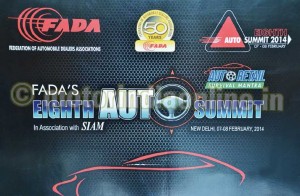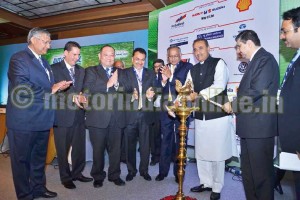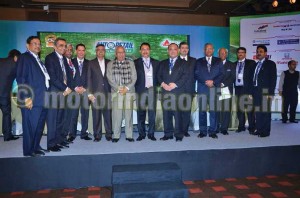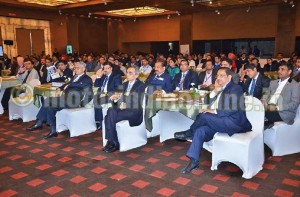 The Indian auto market has a bright future in spite of the unprecedentedly prolonged phase of recession being currently witnessed. This was the message that emerged in no uncertain terms from the deliberations at Auto Summit 2014 held in New Delhi on February 7 & 8. The eminent speakers, including Mr. Praful Patel, Union Minister of Heavy Industries & Public Enterprises, were of the view that the crisis the auto market in India is passing through is short-term and that the long-term growth story remains intact.
The Indian auto market has a bright future in spite of the unprecedentedly prolonged phase of recession being currently witnessed. This was the message that emerged in no uncertain terms from the deliberations at Auto Summit 2014 held in New Delhi on February 7 & 8. The eminent speakers, including Mr. Praful Patel, Union Minister of Heavy Industries & Public Enterprises, were of the view that the crisis the auto market in India is passing through is short-term and that the long-term growth story remains intact.
Addressing the inaugural session as the Chief Guest, Mr. Praful Patel said that his Ministry, being the nodal Government agency for the automobile sector, is equally concerned over the long spell of downturn being experienced by the auto industry in India. To kick-start the auto market, his Ministry has proposed a number of measures, including a stimulus package.
He said that due to the recessionary condition prevailing for a long time, it might not be possible to achieve the targets set in the Automotive Mission Plan 2006-16 within the time-frame given therein. However, the Government remained focused on the goal of increasing the automotive industry contribution to the GDP to 10 per cent as envisaged in the AMP.

Adverting to the concerns voiced by FADA, he pointed out that a mechanism for addressing the concerns of automobile dealers is under the active consideration of the Ministry. As for the skyrocketing of real estate prices, the lack of space and the absence of provision for composite 3-S automobile dealerships in the land use & planning of cities, he emphasized the need for setting up auto malls or clusters on the outskirts of major cities.
Mr. Vikram Kirloskar, SIAM President, and Vice Chairman, Toyota Kirloskar Motor, observed that in view of the downturns encountered by the auto market at regular intervals, there is need for a stepped-up interaction between SIAM and FADA. The current slowdown necessitated concerted effort on the part of all the stakeholders.
Mr. Venu Srinivasan, Chairman & Managing Director, TVS Motor, in his address, opined that the current difficult time the auto industry is passing through is symptomatic of the deterioration in the economy that had set in five years back as a result of the increasing subsidies, soaring inflation and the abnormally high level of fiscal deficit. The current scenario, with real estate prices and manpower costs going through the roof, presented a challenge for all the stakeholders in the automotive business value chain. However, the future is bright indeed, thanks to the young population, rising aspirations of people and low motorization levels in India when compared to similarly placed countries like Indonesia, Thailand and Malaysia. Short-term pain has to be endured for long-term growth.
Mr. Srinivasan exhorted automobile dealers to diversify through peripheral revenue streams, like used vehicle business, finance & insurance business and accessories. The automobile dealership business model ought to change with its focus on used vehicles, service and spareparts.
Illustrating the untapped potential in these areas, he pointed out that while these activities account for 26 per cent of typical automobile dealership revenue in the US, the corresponding figure in India is just eight per cent.
Mr. Srinivasan also suggested that automobile dealers invest in HR and capacity building in order to be prepared to reap the benefit as and when the market revives.
Mr. Uday Kotok, Executive Vice Chairman & Managing Director, Kotak Mahindra Bank, noted with satisfaction that the macro-economic environment is improving slowly but surely after the mayhem in July 2013 when the rupee had touched a new low at Rs. 69 to a dollar, with the current account deficit figures and inflation hovering at alarmingly high levels at that point of time.
Mr. Albert Gallegos, Director – International Affairs, National Automobile Dealers Association (NADA), USA, talked about the relevance of franchise laws for imparting balance in the OEM-dealer relations.

The major findings of the study on “Competitive Benchmarking of Passenger Vehicle Retail Practices of OEMs in India”, conducted by Frost & Sullivan on behalf of FADA, were presented at the special plenary session. Presenting the findings, Mr. V.G. Ramakrishnan, Managing Director, F&S, said that while the sales margins need to be increased in tune with the cost of dealership operations and international norms, margins alone cannot make a dealership viable. In addition to the other factors, how much of the margin is retained by the dealer is what determines the viability or profitability of a dealership.
The key findings and recommendations for OEMs were the need to increase vehicle sales margins, interest-free credit support for procurement of new vehicles for sale (30 days), policy for the first right of rejection to the existing dealers while OEMs plan to expand, increase in labour rates (warranty and free service), policy to support credit of obsolete parts and OEMs’ support for exit through an enabling policy.
The key takeaways for automobile dealers were to collectively contain discounting practice to increase dealer viability, play a key role in supporting the exiting channel partners, promote higher involvement of dealer principals in business management, promote and implement best practices in dealer operations, and to actively co-work with OEMs to support long-term sustainable growth.
Responding to the findings, Mr. Mohit Arora, Executive Director, J D Power Associates – South Asia Pacific, pointed out that J D Power’s study reveals the three major factors leading to dealer satisfaction, namely, the manufacturer’s role in dealership operations, marketing support by the manufacturers, and inter-personal relations and business viability.

Participating in the discussion, Mr. Ranjit Yadav, President, PVBU, Tata Motors, alluding to the paradigm shift in automotive business, emphasised the need for change the business model of automobile dealerships.
Spiritual and motivation session by Mahatria Ra was the highlight of the Auto Summit 2014. Mahatria opined that path to the top was riddled with challenges. He referred to the current slowdown phase as filtering time to gear for the future. In his captivating discourse lasting over one hour, he said that as suggested by the historical evidence, the persons who went on to become great individuals had 7 common traits that set them apart from the rest, namely: (i) Passion for excellence; (ii) Strong communication; (iii) Heterogeneous Relations; (iv) Enthusiasm and energy; (v) Faith (vi) Value-based decision making; and (vii) Methodology to differentiate.
Earlier, Mr. Vinay Nevatia, Chairman, Auto Summit 2014, tracing the history of the summit being organized by FADA biennially since 2000, pointed out that in keeping with the changing dynamics and paradigm of auto retail, the themes of Auto Summits had also evolved to reflect the realities and the scenario at that particular time and the challenges ahead. The theme: ‘Auto Retail – Survival Mantra’ appropriately mirrored the current state of affairs and the mood of the auto market where automobile dealers are finding it extremely difficult to stay viable and survive, necessitating out-of-box thinking and a new survival mantra.
Mr. Mohan Himatsingka, FADA President, in his welcome address, said that while the organized retail hogged the headlines and attention with unfailing regularity, the concerns of auto retail that which is three times the size of the rest of the organized retail hardly found mention in the media and the Government. He suggested that there should be a nodal ministry within the Central Government to address the concerns and issues of auto retail.
He also highlighted some of the major issues of concern, including the high level of road tax and variation therein across States, non-uniformity in registration procedures, grey areas in service tax and the absence of provision for automobile dealerships in the land use and planning which, he said, are not only giving rise to unhealthy practices but also impeding the auto market growth.
Voicing his concern over the prolonged slowdown and deteriorating viability of automobile dealerships, Mr. Himatsingka called upon the Government and the manufacturers to come up with special measures to shore up the auto market.
The two-day programme of Auto Summit 2014 comprised a special plenary session, three business sessions, on an interactive session with vehicle manufacturers, and six workshops. The workshops focused on improving efficiency, productivity and profitability of automobile dealerships through improvement in HR practices, manpower training & employee satisfaction, technology & processes, and use of social media & internet, plugging leakages, and diversification.
Galaxy of other speakers who addressed and interacted with the participants included: Pawan Munjal, Managing Director & CEO, Hero MotoCorp; Keita Muramatsu, President & CEO, HMSI; Arvind Saxena, Managing Director, Volkswagen Group Sales India; Rajesh Jejurikar, Chief Executive – Tractor & Farm Mechanisation, M&M; Lowell Paddock, President & Managing Director, General Motors India; Pravin Shah, Chief Executive, Automotive Division, M&M; Ravi Pisharody, Executive Director – Commercial Vehicles, Tata Motors; Rajive Saharia, Head – Trucks, Ashok Leyland; Sandeep Singh, Dy. Managing Director & COO, Toyota Kirloskar Motor; Rohit Bhan, Head – Network Development, Daimler India Commercial Vehicles; Arun Malhotra, Chief Sales & Customer Care Officer, M&M; J. Sen, Sr Vice President, Honda Cars India; Sumit Sawhney, Managing Director and CEO, Renault Group in India; Tarun Garg, Vice President – Sales, Maruti Suzuki India; Partho Banerjee, Vice President – Dealer Development & Sales Support Div., Maruti Suzuki India; Bernard Lycke, Director General, CECRA; Amit Nandi, Vice President, KTM, Bajaj Auto; Ajay Dikshit, AVP – Dealer Learning & Development, Hero MotoCorp; Roy Kurian, Vice President, Yamaha Motor India; Manish Arora, Zonal Head – North & Central, Swaraj Tractors Division, M&M; Nitin Prasad, Managing Director, Shell Lubricants India; Kamalakar Sai, Director – Sales, IndiaFirst Life Insurance; Rajiv Sabharwal, Executive Director, ICICI Bank; Prof. K. Ramachandran, Indian School of Business, Hyderabad; Prof. M.L. Singla, FMS, University of Delhi; Jayesh Jagasia, Managing Partner, Sewells Group India; Vinay Sanghi, CarTrade.com; Ms. Emrana Sheikh, HR Head, M&M; Sunil Chaturvedi, CEO, ASDC; Kailash Gupta, Past President, FADA; Sharath Vijayaraghavan, Sundaram Motors; Sanjay Datta, Chief – Underwriting & Claims, ICICI Lombard General Insurance; Dipankar Acharya, Regional Chief Executive, North & West, Royal Sundaram Sun Alliance GIC; and Ashok Padhye, Carazoo.com.
Auto Summit 2014 was a momentous occasion, in that it coincided with the Golden Jubilee Year of FADA that came into being in 1964. It assumed special significance, as FADA conferred the Life Time Contribution Award on the two icons of the Indian auto industry, namely, Dr. Brijmohan Lall Munjal and Mr. Ratan Tata (in absentia), for their phenomenal contribution to the growth and development of the auto industry in India.
The two doyens of auto retail, Mr. Arun Sanghi and Mr. Rakesh Jain, both past Presidents of FADA, were also honoured on the occasion with Life Time Achievement Awards for their pioneering role in promoting the growth & development of auto retail in India and of FADA.
Presentation of the Automotive Dealership Awards for 2013 was an integral part of the programme of Auto Summit 2014. The awards to the worthy winners in the 5th edition of ADEA were presented at a glittering ceremony on February 7 in which Mr. Pawan Munjal, Managing Director & CEO, Hero MotoCorp, was the Chief Guest; and Mr. Rajiv Sabharwal, Executive Director, ICICI Bank, the Guest of Honour.
The awards presentation ceremony was preceded by a panel discussion on ‘Dealer Satisfaction – An Elusive Story?’, which brought forth key issues of concern to automobile dealers, viz., dealer viability, dealer-manufacturer relations, etc.
All in all, Auto Summit 2014 was an enriching and rewarding experience for all the participants.